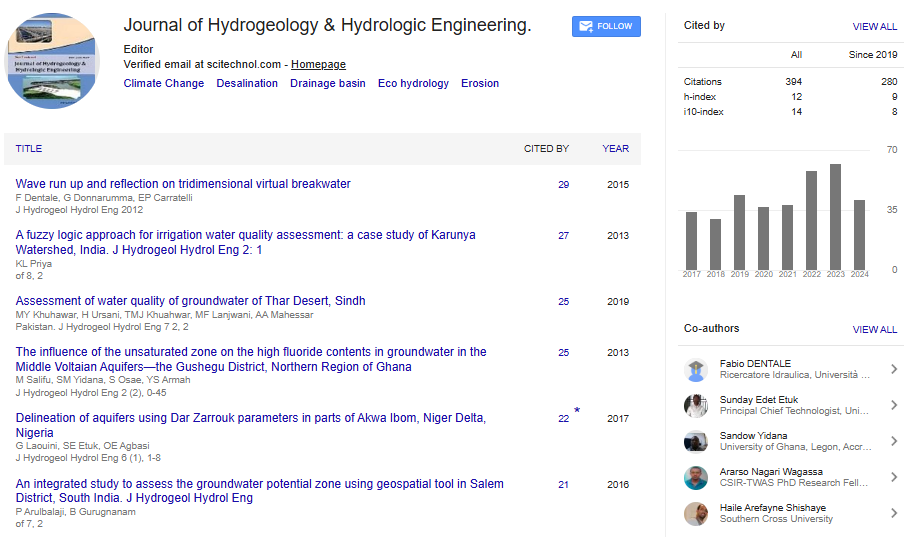Commentary, J Hydrogeol Hydrol Eng Vol: 12 Issue: 5
The Depths and Exploring the Intricacies of Hydrogeology
Sijia Zhu*
Department of Aquatic Ecology, University of Duisburg-Essen, Essen, Germany
*Corresponding Author: Sijia Zhu,
Department of Aquatic Ecology, University of Duisburg-Essen, Essen, Germany
E-mail: zhusijia28@gmail.com
Received date: 18 September, 2023, Manuscript No. JHHE-23-121473;
Editor assigned date: 20 September, 2023, PreQC No. JHHE-23-121473 (PQ);
Reviewed date: 05 October, 2023, QC No. JHHE-23-121473;
Revised date: 13 October, 2023, Manuscript No. JHHE-23-121473 (R);
Published date: 23 October, 2023, DOI: 10.4172/2325-9647.1000290
Citation: Zhu S (2023) The Depths and Exploring the Intricacies of Hydrogeology. J Hydrogeol Hydrol Eng 12:5.
Description
Hydrogeology, the study of water beneath the Earth's surface, is a multifaceted field that delves into the complexities of groundwater, its movement, distribution, and interaction with geological formations. This branch of geoscience plays a pivotal role in understanding the Earth's subsurface water systems, influencing various aspects of human life, environmental sustainability, and geological processes.
Understanding hydrogeology
Groundwater dynamics: At the heart of hydrogeology lies the intricate dynamics of groundwater. Unlike surface water, which flows visibly in rivers and streams, groundwater exists beneath the Earth's surface, often hidden within aquifers porous and permeable rock formations that store and transmit water. The movement of groundwater is governed by various factors, including geological formations, topography, climate, and human activities. Understanding these dynamics is essential for managing and sustaining water resources.
Aquifers and porous media: Aquifers act as natural reservoirs, holding vast amounts of groundwater. Their properties vary significantly, from highly permeable materials like sand and gravel to less permeable formations like clay. Hydrogeologists study these porous media to determine their capacity to store and transmit water, essential for predicting water availability and quality.
Applications of hydrogeology
Water resource management: The knowledge gleaned from hydrogeological studies forms the backbone of effective water resource management. By mapping aquifer characteristics, monitoring water levels, and analyzing flow patterns, experts can make informed decisions about groundwater extraction, preventing overexploitation and ensuring sustainable water supplies for communities, industries, and agriculture.
Environmental impact assessment: Hydrogeology plays a precarious role in assessing the environmental impacts of various activities, including mining, construction, and waste disposal. Understanding how groundwater interacts with contaminants helps in predicting their spread and devising strategies to mitigate pollution, safeguarding both human health and ecosystems.
Geotechnical engineering: In construction and infrastructure development, understanding subsurface water behavior is fundamental. Hydrogeological insights aid in designing stable foundations, assessing risks related to groundwater seepage, and implementing effective drainage systems, minimizing potential hazards.
Tools and techniques
Remote sensing and geophysical methods: Advanced technologies such as satellite imagery and geophysical surveys allow hydrogeologists to map subsurface structures and identify potential groundwater sources. These tools provide invaluable data for understanding aquifer characteristics without invasive methods.
Modeling and simulation: Hydrogeological modeling employs mathematical and computational techniques to simulate groundwater flow and predict its behavior under different scenarios. These models aid in decision-making processes, allowing for the evaluation of potential outcomes and the formulation of effective management strategies.
Challenges and future directions
Groundwater depletion: The overexploitation of groundwater resources poses a significant challenge globally. As demands increase due to population growth and industrialization, aquifers face depletion, leading to issues such as land subsidence and saltwater intrusion in coastal areas. Addressing these challenges requires a comprehensive approach involving sustainable practices and policy interventions.
Climate change impacts: Climate change brings unpredictable shifts in precipitation patterns, potentially altering groundwater recharge rates and availability. Studying the intricate connections between climate change and groundwater dynamics is essential for adapting to these changes and ensuring water security in the face of environmental variability.
Conclusion
Hydrogeology stands at the intersection of geology, environmental science, and engineering, offering invaluable insights into the Earth's hidden water resources. As we navigate a world with growing water demands and environmental challenges, the knowledge derived from hydrogeological studies becomes increasingly vital. By harnessing innovative technologies and interdisciplinary approaches, we can safeguard and sustainably manage this invaluable resource for current and future generations.
 Spanish
Spanish  Chinese
Chinese  Russian
Russian  German
German  French
French  Japanese
Japanese  Portuguese
Portuguese  Hindi
Hindi 
